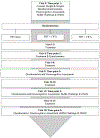The shifting perspectives study protocol: Cognitive remediation therapy as an adjunctive treatment to family based treatment for adolescents with anorexia nervosa
- PMID: 33539993
- PMCID: PMC8489286
- DOI: 10.1016/j.cct.2021.106313
The shifting perspectives study protocol: Cognitive remediation therapy as an adjunctive treatment to family based treatment for adolescents with anorexia nervosa
Abstract
Background: Adolescents with anorexia nervosa have set-shifting inefficiencies that can be exacerbated by starvation and that may interfere with outcomes of treatment interventions. Cognitive Remediation Therapy (CRT), an adjunctive treatment focused on improving set-shifting, can target inefficiencies and may augment treatment effectiveness. The best way to add CRT to the standard of care (Family Based Treatment, FBT) for adolescents with anorexia remains understudied.
Methods/design: This is a randomized controlled trial designed to determine if CRT is effective in increasing flexibility in adolescents with anorexia and/or their parents. Participants are adolescents 12-18 years old with anorexia and their parents. 54 family groups will be randomized into one of three groups: FBT only, FBT plus Parent-focused CRT, or FBT plus Adolescent-focused CRT. Psychosocial, neurocognitive, and behavioral measures will be collected throughout the study.
Discussion: This is the first study of its kind to apply CRT to parents. All forms of CRT in the context of anorexia have targeted the individual with anorexia's thinking style. We propose that it may be impactful to target the parent of the adolescent with anorexia as parents carry the burden of treatment and re-nourishment of their child during FBT and may have similar thinking styles.
Conclusion: This study takes an experimental therapeutics approach to further our understanding of the mechanisms of treatment for adolescents with anorexia. It focuses on increasing cognitive flexibility in patients or their parents and determining the appropriate dose of CRT needed to achieve positive change.
Trial registration: ClinicalTrails.gov Identifier NCT03928028.
Keywords: Adolescents; Anorexia nervosa; Cognitive remediation therapy; Family based treatment; Randomized controlled trial; Set shifting.
Copyright © 2021 Elsevier Inc. All rights reserved.
Conflict of interest statement
Declaration of interests
The authors declare that they have no known competing financial interests or personal relationships that could have appeared to influence the work reported in this paper.
Figures


References
-
- Association AP. Diagnostic and statistical manual of mental disorders (DSM-5®). Washington D.C.: American Psychiatric Association; 2013.
-
- Peebles R, Sieke EH. Medical complications of eating disorders in youth. Child and Adolescent Psychiatric Clinics. 2019;28(4):593–615. - PubMed
-
- Arcelus J, Mitchell AJ, Wales J, Nielsen S. Mortality rates in patients with anorexia nervosa and other eating disorders: A meta-analysis of 36 studies. Archives of General Psychiatry. 2011;68(7):724–731. - PubMed
Publication types
MeSH terms
Associated data
Grants and funding
LinkOut - more resources
Full Text Sources
Other Literature Sources
Medical
Research Materials

